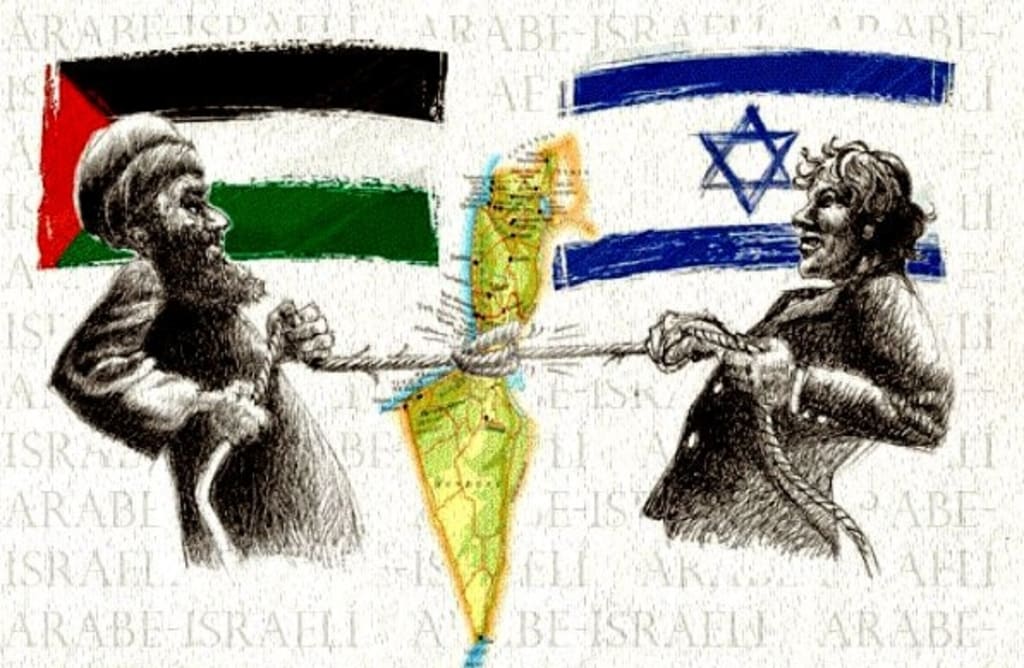The Israel-Palestine Conflict: Historical Roots and Current State
Unraveling the Complex Tale: The Israel-Palestine Conflict - Historical Legacy and Current Quagmire

Historical Roots of the Conflict
The conflict between Israel and Palestine has deep historical roots dating back to the late 19th and early 20th centuries when tensions began to arise between Jewish and Arab communities in the region of Palestine, which was then part of the Ottoman Empire.
During World War I, British forces occupied Palestine, and in 1917, they issued the Balfour Declaration, expressing support for the creation of a "national home for the Jewish people" in Palestine. This laid the groundwork for Jewish immigration to the region.
Jewish migration increased during the 1920s and 1930s, leading to heightened tensions between the Jewish community and the local Arab population. Violence erupted in the 1930s, and the conflict escalated in the 1940s.
The Partition of Palestine and the Creation of Israel
After World War II and the Holocaust, international sentiment in favor of an independent Jewish state grew significantly. In 1947, the United Nations proposed a plan to partition Palestine into two states, one Jewish and one Arab, with Jerusalem under international control.
While Jewish Zionist leaders accepted the plan, Arab leaders rejected it, arguing that it infringed upon the rights of the Arab majority in Palestine. In 1948, when Britain withdrew from Palestine, David Ben-Gurion declared the independence of the State of Israel. This led to the outbreak of the First Arab-Israeli War, in which neighboring Arab nations invaded Israel.
The Conflict and its Ramifications
The First Arab-Israeli War resulted in a series of ceasefire agreements but failed to resolve the fundamental differences between the parties. Over the decades, the conflict has led to a series of armed confrontations, including the Six-Day War in 1967, the Yom Kippur War in 1973, and conflicts in Lebanon and the Gaza Strip.
The central issue of the conflict revolves around land and territories, with Israel and Palestine disputing sovereignty over specific areas, including Jerusalem. It is also heavily influenced by religious factors, as Jerusalem is a sacred city for both Jews and Muslims.
Furthermore, Israeli occupation of the West Bank and Gaza Strip has led to constant tensions and influenced regional and international public opinion.
Peace Agreements and Mediation Efforts
Throughout the years, numerous mediation attempts and peace agreements have been made to resolve the Israeli-Palestinian conflict. One of the most notable agreements is the 1993 Oslo Accords, which established a framework for Palestinian autonomy in parts of the West Bank and Gaza Strip.
Despite these efforts, the situation has remained tense and characterized by violence, Israeli settlements in the West Bank, and Palestinian resistance. The lack of a lasting peace agreement has led to political deadlock and ongoing suffering for the affected populations.
The Current State of the Conflict
To this day, the conflict between Israel and Palestine persists. While there have been periods of relative calm and moments of peace negotiations, violent clashes and tensions continue to arise.
One of the fundamental issues is the lack of consensus on key matters such as borders, the division of Jerusalem, and the right of return for Palestinian refugees. Additionally, the pressure from the international community to find a solution has been inconsistent and at times limited in its effectiveness.
The Role of the International Community
The international community has played a significant role in the Israeli-Palestinian conflict, with various actors attempting to mediate and promote peace solutions. Organizations such as the United Nations, the European Union, and the United States have been involved in various peace efforts over the years.
However, divisions within the international community, along with shifting interests and concerns, have hindered the resolution of the conflict. Furthermore, the influence of extremist groups on both sides has further complicated the landscape.
Current and Future Challenges
The Israel-Palestine conflict remains a formidable challenge with serious repercussions for regional and international stability. The situation in the Gaza Strip, settlements in the West Bank, and the absence of a significant peace process are pressing issues that require a sustainable solution.
The future of the conflict is uncertain, but many continue to advocate for a two-state solution that allows for the peaceful coexistence of Israel and Palestine. Nevertheless, resolving key issues such as borders, Jerusalem, and refugees remains a formidable challenge.
Conclusion: A Persistent Conflict
The Israel-Palestine conflict has left a deep mark on the region's history and has affected generations of people. Despite mediation efforts and peace negotiations, the conflict remains an outstanding issue on the international stage.
Resolving the Israeli-Palestinian conflict is a complex and multifaceted challenge that requires the cooperation of both parties and the support of the international community. In the meantime, the pursuit of peace and stability in the region continues, and the hope for a sustainable solution remains an essential goal for a better future in the Middle East.
About the Creator
Johan Jaramillo
Passionate about writing articles, stories, and tales. Each word is a blank canvas that breathes life into new worlds and emotions. Writing is my sanctuary, my way of expression, and sharing my passion with the world.






Comments
There are no comments for this story
Be the first to respond and start the conversation.